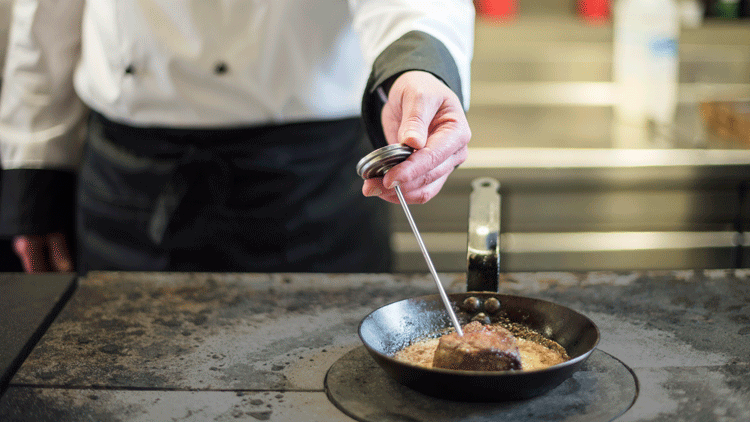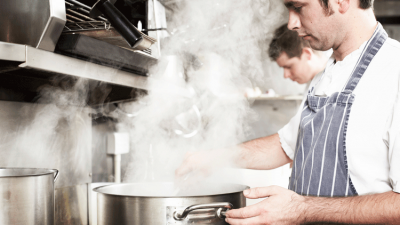Sponsored by Nisbets In Place
Getting serious about food safety

The importance of food safety and allergen labelling came into sharp focus last month following the news that two customers of the high-street sandwich chain had died after suffering allergic reactions to the food they were served.
The company has since announced that it will start showing a full list of ingredients and allergens on its packaging and use prominent allergen warning stickers on all of its freshly made products, but for the families of the two people that died its actions are all too late.
The Pret A Manger incidents may be worst-case scenarios, but they highlight just how vital it is for restaurant operators and their employees to understand and adhere to strict health and safety regulations, and put in place stringent controls around allergens to ensure the safety and wellbeing of all their guests.
For a business that operates just one restaurant, keeping on top of health and safety and allergen regulations can be tricky, but it is even harder for restaurateurs that run multiple sites. This was something addressed by chef and restaurateur Adam Handling, speaking at last month’s launch of catering equipment supplier Nisbets’ In Place series.
Handling runs a number of venues, including two The Frog restaurants in Hoxton and Covent Garden, a zero-waste café called Bean & Wheat and his Hoxton bar Iron Stag. The chef will also soon open a restaurant in The Cadogan hotel in Chelsea. “Now that we have lots of sites, food safety is crazy,” he says.
Handling has a number of systems in place at his venues to ensure the company meets health and safety regulations. He describes his restaurants as being “very high tech” with each having an iPad on the wall where staff can keep track of all health and safety and allergen requirements, something he says is becoming increasingly difficult.
“From the time I was trained until now, it’s definitely changed,” he says. “Back then you washed your hands and cleaned up after yourself, it wasn’t so strict. Now, councils are much harder to deal with. You can really see
the difference.”
Having restaurants in different London locations means Handling has to adhere to different councils’ rules, with Westminster council particularly challenging to deal with, he says. “Food legislation changes all the time, especially the way things are cooked. Westminster Council changes its mind on how food safety should be more than I change my underwear.”
HACCP sees restaurants assess what could go wrong and how it could be prevented
For example, he says he can’t serve pigeon at the Covent Garden site because Westminster Council requires it to be cooked well done. To safeguard the business, Handling works closely with auditing company Food Alert to ensure all of the group’s restaurants are up to speed with changing health and safety regulations. Food Alert audits all his restaurants every three months, which he describes as “brutal” but necessary. “It is a lot more frequent than the environmental health officers.”
This is something Neil Rankin, chef director at three-strong restaurant group Temper also does. Temper has a food safety consultant who ensures it follows the correct steps and updates staff on legislation. “We have constant training and checks from us and food safety consultants,” he says.
At Elystan Street restaurant in Chelsea, head chef Toby Burrowes explains how he ensures the kitchen adheres to all the various regulations. “It’s really a culture we all adhere to,” he says. “Also we have a separate, outside, food safety company that helps us tick the boxes and keep our five- star health rating.”
Storage solutions
To ensure a business meets its health and safety requirements, Handling advises putting in procedures from the outset and sticking to them. “Make sure you have your procedures in place because the week you start serving the customer, that’s it. You get inspected immediately. You should ensure, before you have your menus written, that you have thought about HACCP (hazard analysis and critical control points) and food allergens. You need to make sure you’re on top of everything.”
Deliveries almost always take place when the chefs are in the restaurants to keep tabs on quality and to ensure the correct order has been delivered. Handling says that every product is stored in a way to make it last longer – for instance, all herbs are removed from their plastic and wrapped in a damp J-cloth and rolled up.
At The Frogs, fish is broken down immediately and chilled fast and there is a separate drying fridge for joints of meat. Raw and cooked proteins are stored separately and there are separate fridges for raw meat and fish. “If everything is stored in the correct areas you should be fine,” he says.
Having previously worked in hotels, Handling says his restaurant business is very different to larger operations. “How I’ve done date coding in big hotels and how I do it here is very different. In big hotels you have a big surplus because if a guest wants something that isn’t on the menu you’ve got to have some stuff around. Here, I will date code for two or three days depending on the products (two days for fish) but it will likely be used up on the same day or, if not, for tomorrow lunch.”
Allergen warning systems
When it comes to allergens, Handling takes things very seriously. The group does a lot of allergen training and everyone goes on a course before they start serving customers. “The training that we do in my restaurant group is never ending – every day’s a school day,” he says.
When the restaurant makes its confirmation call backs, staff enquire as to whether any guests have any allergies and those who do have their own menus with different coloured checks.
“It makes sure everybody is on the ball. Not all staff might know what the allergen is but because the check has a colour they know there’s an issue on the table, and that kind of ‘baby proofs’ every person. It’s not just the chef that has to worry about it, it’s the waiters and the bar staff, it’s the whole restaurant.”
Handling sees the recent allergen crisis at Pret as a stark warning to all restaurateurs. He says: “You can’t control everyone who works for you. All it takes is one fuck-up from a member of staff and you get sued, and you close the restaurant immediately because the fines are ridiculously high. It’s very worrying. “Your staff don’t care the same as you do. For them it’s just a job and they could be quite young or new to the industry.”
Know your allergens: there are 14 major allergens which need to be communicated to customers
He’s not alone with his concerns. “It’s hard to be more terrified than I already am but it hits home that even if you follow legislation it won’t give you comfort if someone dies and it won’t save you from outside condemnation,” says Rankin. “Pret is a well oiled machine with hygiene and food safety standards above most but someone still died eating their food. I don’t know how I’d deal with that.”
Rankin says that restaurateurs need to take numerous steps to ensure the safety of customers with allergies. Temper buys its produce from suppliers who it trusts and have all the right health and safety systems in place and constantly trains its staff on food legislation.
“We’re updated on legislation constantly and everyone is trained,” he says. “The company also has daily briefings and management checks on recipes, which are always written by me so there can be no confusion.”
In addition, Temper’s till software flags allergies in its order system and on the tickets. “We store a food matrix on site which lists every dish and every dish’s recipe is stored on our system,” adds Rankin.
At Elystan Street, Burrowes has a rather more low-tech but equally effective system. “We always label any dish that has changes with a simple Post-It note to make it super obvious to the waiters. Our staff are very well trained on what allergens our dishes contain, and with intelligent menu writing, there are plenty of great options that cover just about all the allergens.”
At burrito restaurant group Tortilla, all sites have a nutritional and allergen booklet for staff to consult, says head of food Martyn Clover. “Any questions customers have about allergens they’ve got the booklet there which they can go through. It contains all the information on what’s in the food and what might be in there in terms of trace elements so customers can make the best decisions on what they want to eat.”
The company has a supply chain team that audits its suppliers and makes regular checks on food labelling. “There are quite a lot of steps involved to have the most information we can.”
One method Handling employs to try to avoid food safety issues is to empower his staff and give them ownership over decision making. “You get more out of people if you allow them to take control of situations themselves,” he says. “If you micromanage, their minds are going to wander and they are going to get bored and lazy. You want people who are totally accountable.
“With the hotel opening, I will have 210 staff. I can’t do everything and my group chef can’t do everything but if you allow people to do things, they will progress. And if they progress at something, they get very excited and they really take it by the balls. Good hygiene and food safety is having care for what you’re doing.”
All the chefs agree that keeping abreast of food safety issues is an ongoing process. “You never want to be complacent about this sort of thing,” says Clover. “When stuff like [the Pret deaths] happen it definitely makes you aware of your responsibilities as a restaurant. This is serious stuff.
“We’ve done a lot of the work fairly recently so we’re as confident as we can be, but it’s a never ending process.” What advice would these chefs give to others on the best ways to keep abreast of health and safety and food safety regulations? Burrowes suggests the following: “Speak to your local council, keep informed and do your level 3 foodsafe because knowledge is power. There are plenty of companies out there who do this sort of thing very well.”
Rankin also advises that restaurants seek outside professional help to stay on top of things, but adds a stark warning to restaurateurs. “Be terrified and expect the worst,” he says. “Don’t trust that it’s just being done and hire a consultant to keep you updated on the law. Also, avoid having lots of dishes with nuts in them.”

















